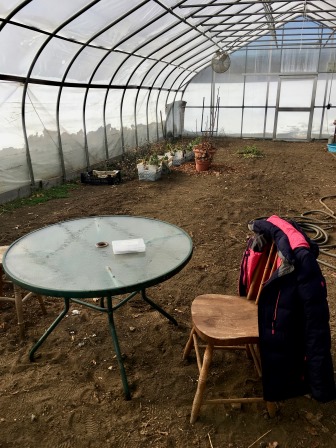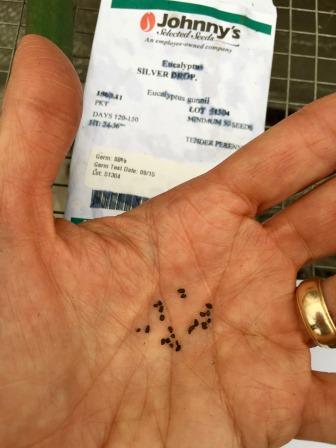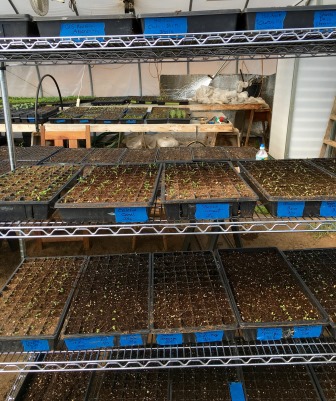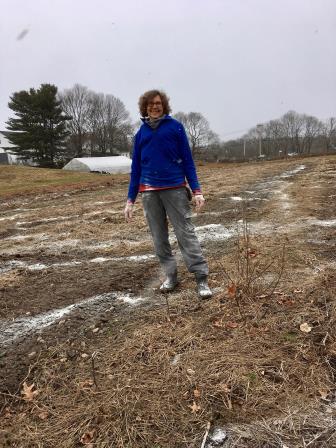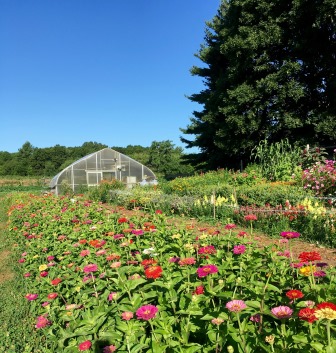~April 2017~
Written by Ruth Trimarchi, Manager of Flower Operations
We Start Anew
As a nor’easter bears down on our small greenhouse, it is hard to imagine that these dozens of trays of inch-high flowers will soon fill those snow-covered fields outside. But this is how flower season at Wright-Locke Farm starts. In February the first seeds of eucalyptus, straw flowers, delphinium, celosia and others are carefully started in our tiny incubator, nurtured through dozens of labor-intensive ‘bottom-watering’ cycles so that light-sensitive seeds are not disturbed, graduated to our gently-heated greenhouse, and then finally transferred outside for a week of hardening off before being planted into solid earth starting in May.
Poor Man’s Fertilizer
Meanwhile in the fields outside, these late spring snows truly are a “poor man’s fertilizer” as my grandparents farming in Vermont were fond of saying. Only recently did I learn that not only does snow serve as a source of water and insulation, but it also captures nitrogen when snowflakes crystallize in the atmosphere, and brings this important nutrient back down into the soil. Exploring this passion for growing flowers is made so much easier today than farming was for them, in no small part due to the ability to investigate information like nitrogen-capturing snowflakes online. My grandparents would have been astounded at how much you can learn about farming with the click of a button!
Fortunately for all of us, I have real-people resources in addition to the internet. Adrienne Altstatt, our Farm Manager gave us “A Glimpse of the Life of a Farmer” in her terrific blog last month. Though I’ve been gardening for decades, last year was my first season growing flowers at Wright-Locke Farm, and Adrienne’s matter-of-fact “It’ll all be fine” was a welcome response to my frequent “oops”! Flowers have their own rhythm and are more fragile than many veggies, but they are subject to fewer pests – and like veggies, growing flowers also takes faith and a great deal of patience. Planting thousands of near-microscopic dark colored seeds into black potting soil requires focus, deep breathing and frequently, tweezers. It never fails to amaze me that these teeny packets of DNA and requisite foodstuffs respond to our gentle nurturing, some air, some water and a little organic fertilizer, and transform themselves into colorful plants as tall as ten feet within a few months.
Gosh this is hard work!
It is a challenge bringing an interesting selection of fresh flowers to market each week, and requires successional plantings of many of our dozens of flower species. Trying to keep a changing array of colors, textures and blossom sizes that work well together in bouquets, all blooming throughout each week of the season, requires pouring over multiple spreadsheets during the winter months. Strategizing how to rotate beds so that recurring pests like cut worms and powdery mildew are minimized leaves me cross-eyed. As does clustering species with similar netting needs, maximizing sun placement within our small field and creating shade and moisture microenvironments that hopefully provide ideal conditions for each species. Balancing these factors with the field life of each species, vase life, irrigation options, harvesting time, and cost often leaves me feeling like a pretzel!
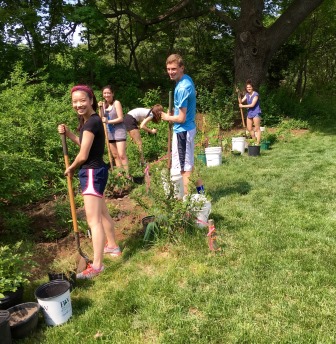
Thank Goodness for Volunteers!
Fortunately I don’t do all of this alone. In addition to our Farm Manager, the flower operations are blessed with an amazing team of volunteers. Last year dozens of volunteers, from pre-teens to folks with decades of life experience, showed up to seed, weed, water, plant, harvest and generally help out in myriad ways. The Farm is especially lucky to have a loyal team of highly talented floral designers who help us bring those beautiful flowers directly from our fields to vases for you.
Why do local flowers matter?
I grow flowers because I love flowers. And because it is very satisfying to grow flowers for this beloved community Farm. Locally grown flowers offer community residents the opportunity to:
- buy local
- support sustainable agriculture
- add variety to their flower species
- purchase flowers that have longer shelf-life
- purchase flowers that have a reduced carbon footprint
- purchase flowers that are grown without herbicide or pesticide exposure for farm workers growing the flowers
- provide biodiversity for bees, birds and other animals
- provide beauty without endangering the environment
I never envisioned myself following in my grandparents’ footsteps, but I am so grateful for this amazing journey and opportunity to bring beauty to our community. Stop by and visit our ever-changing beautiful flower fields throughout the season!
